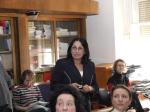Petra Uhlíková: The Rational Mind Cannot Do It Alone (On Risks and Prevention of Eating Disorders)






2 March 2011
Between March 3 and March 5, 2011, the Charles University 1st Faculty of Medicine and the Psychiatry Clinic of the General Teaching Hospital will host the 8th International and Interdisciplinary Conference on Eating Disorders. The conference is organized in collaboration with INTACT, an Marie Curie international project that brings together nine Centers of Excellence from EU countries. The project supports postgraduate students of medicine and psychology focusing on eating disorders. The objective of the conference is international exchange of experience and knowledge in postgraduate research and presentation of research projects that develop innovation programmes in treatment and prevention of eating disorders.
zleva: Prof. MUDr. Jiří Raboch, DrSc., přednosta Psychiatrické kliniky VFN a 1. LF UK, Prof. MUDr. Hana Papežová, CSc., vedoucí Centra pro poruchy příjmu potravy Psychiatrické kliniky VFN a 1. LF UK, MUDr. Jan Bříza, CSc., MBA, zástupce ředitelky VFN, MUDr. Petra Uhlíková, vedoucí denního stacionáře pro adolescenty
8. Mezinárodní a mezioborová konference o poruchách příjmu potravy a obezitě-tisková zpráva
What about university students?
|
MUDr. Petra Uhlíková, head of the day care centre for adolescents |
One would think that there is nothing easier to eat when you are is hungry, unless you are physically ill, but that’s not true. Why is it so complicated? If we’re speaking of a disorder, it is because the patients feel very anxious about what is going to happen next – that they will gain weight, look less attractive, change for worse or that something bad will happen to them. When growing up, adolescents may fear physical changes similar to gaining weight – they are growing, their proportions change, girls grow fat reserves. Then their anxiety prevents them from eating. How many of your patients are university students suffering from eating disorders? I don’t have a precise number right here, but there is certainly quite a lot of them. It doesn’t relate to education as much as to work stress or ambition. Perfectionism is one of the important causes of eating disorders, so students of medicine, who have a huge workload, are at risk. |
What are the most frequent symptoms of psychological breakdown resulting from school-related stress?
Among such symptoms are lifestyle changes, mood disorders, such as anxieties and depressions, replacement of personal interests in favour of excessive schoolwork. I might be exaggerating a little, but excessive focus on performance at school accompanied by some form of anxiety is already pathologic, as it limits the person in his or her everyday life. For example, someone does not take an exam, although he or she was studying hard, and then the stress is mounting. Then the end of the exam term comes, they haven’t passed any exams yet and they are falling even deeper into depression. In the better cases, they come here, but they might quit school or find other ways of dealing with the stress, including even suicide attempts.
What is the way out of the vicious circle of various symptoms of eating disorders?
Mainly prevention through healthy self-evaluation, self-esteem and sufficient self-confidence and resulting reasonable expectations of a young person by himself or herself and by the people around him or her –in the early stages of life, these are parents and teachers. Of course, all parents want their kids to be the best, but if it’s above the abilities of the child, it is in fact a traumatizing expectation that the child will never be able to fulfill. Then the child becomes chronically frustrated and continuously haunted by failure of meeting these expectations. What I recommend to parents is to positively praise their children, fully and unconditionally, which is very important. Only a few parents can tell their children “You are the best in the world”. They tend to say “It’s OK, but you could do a little more, put more effort into it” and so on. That’s in fact criticism, not praise.
You said that eating disorders do not relate to education. When a university student realizes something is wrong, does it help to learn about the disorder on his or her own and try to approach it rationally and motivate himself or herself by realizing this?
That’s not very helpful. I think it can make it even worse.
Then the cause of an eating disorder is something deep inside the unconscious, or how to put it?
Anxiety is a mechanism that cannot be controlled by intellect – it is difficult to process rationally. A rational thing one can do is to seek a specialist and get some advice. To rationally grasp one’s emotional state is difficult even for adults. In adolescents it’s even harder, because some of them might not be mature emotionally, especially the very intelligent ones. They might develop fast in the rational part, but their emotional intelligence takes more time. And if there is a disproportion between the two, they do not understand their own emotional states, their experience of life – they don’t know what’s happening to them and why. The rational mind cannot do it alone.
(Marie Kohoutová)
Translation: Jaroslav Švelch
